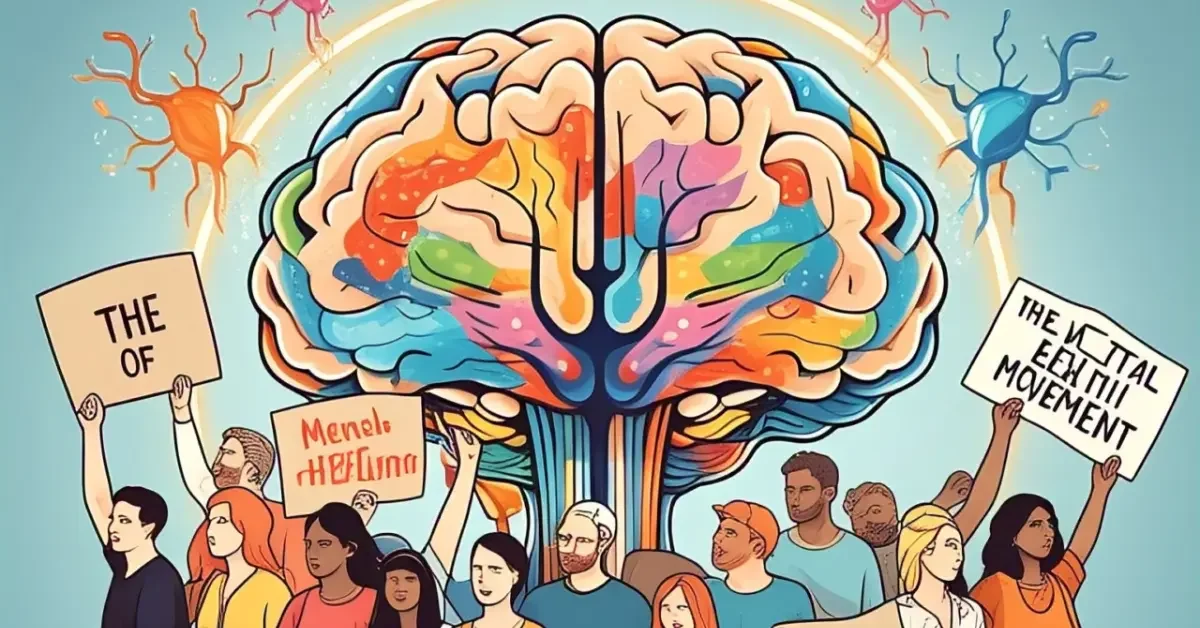Over the past few years, the mental health movement has gained significant momentum, advocating for awareness, understanding, and proactive approaches to mental well-being. This movement emphasizes the importance of recognizing your mental health needs and encourages you to prioritize self-care and emotional resilience. By exploring the resources, strategies, and support systems available, you can actively engage in your mental health journey, fostering a stronger, more empowered you. Join us as we probe into the various aspects of this transformative movement and how you can harness its power in your life.
Key Takeaways:
- Empowerment: The movement emphasizes the need for individuals to take charge of their mental health through self-awareness and proactive strategies.
- Community Support: Connecting with others facing similar challenges fosters a sense of belonging and provides a support system that is vital for mental well-being.
- Education and Resources: Access to information and tools is important for understanding mental health issues and developing effective coping mechanisms.
Understanding Mental Health
While you may have heard about mental health frequently, it is imperative to grasp its meaning and significance fully. Mental health encompasses your emotional, psychological, and social well-being. It affects how you think, feel, act, and navigate through life. Additionally, the state of your mental health influences how you handle stress, relate to others, and make choices. Recognizing the importance of mental health is the first step toward improving your overall well-being and quality of life.
Definition and Importance
The importance of mental health cannot be overstated. It plays a significant role in your capacity to lead a fulfilling life. When mental health is prioritized, it enhances your productivity and can positively influence your physical health. Mental health intersects with various aspects of life, including your relationships, academic and career success, and personal satisfaction. Understanding this concept empowers you to take proactive steps in nurturing your mental well-being.
Common Mental Health Disorders
Importance lies in recognizing that mental health disorders are prevalent and can affect anyone at any stage of life. Common disorders include anxiety, depression, bipolar disorder, and schizophrenia, among others. These conditions can manifest in various ways, often affecting your thoughts, feelings, and behaviors. Being aware of these disorders allows you to identify symptoms in yourself or others and seek help when necessary, ensuring that you are not facing these challenges alone.
Understanding common mental health disorders can offer a sense of relief. You might find that you are not alone in your experiences, as millions of individuals face similar challenges daily. By becoming informed about these disorders, you can eliminate stigma and create an environment in which you and others feel safe discussing mental health concerns openly. This awareness is vital for improving not only your own mental health but also that of those around you.
The Impact of Mental Health on Daily Life
Common experiences of individuals with mental health concerns showcase the significant impact these disorders have on daily life. Your mental state can affect your energy levels, motivation, and ability to engage in everyday activities. When mental health challenges arise, they can inhibit your capacity to maintain healthy relationships, pursue work or school responsibilities, and enjoy leisure activities. This can lead to a cycle of distress, as feelings of hopelessness and isolation often compound the underlying issues.
Continuously reflecting on the impact of mental health on daily life can help you identify areas where improvements can be made. As you work to enhance your mental well-being, you may notice changes in your productivity, interpersonal relationships, and overall satisfaction with life. By prioritizing your mental health, you empower yourself to face challenges with optimism and resilience, fostering a more fulfilling existence.
Mental health is a defining factor in your overall well-being and can significantly influence your ability to thrive in life’s various roles. Acknowledging its importance and understanding the common disorders can serve as a foundation for making informed choices about seeking help and resources. By doing so, you can actively work toward a more balanced and fulfilling life.
The History of the Mental Health Movement
Any discussion of mental health today requires an understanding of its history. The evolution of perspectives on mental health has shaped the landscape of care and advocacy you see today. From ancient times to the present, attitudes towards mental health have undergone significant changes, influenced by cultural, religious, and scientific developments. Recognizing this history is necessary for you as you engage with ongoing discussions about mental well-being.
Early Perspectives on Mental Health
On examining the early perspectives on mental health, you may find that they were often steeped in superstition and misunderstanding. In ancient civilizations, mental health conditions were frequently attributed to demonic possession or punishment by the gods. People displaying symptoms of mental illness were often marginalized, facing brutal treatments or being shunned from society. As you learn about this history, it’s fascinating yet disheartening to see how far we have come from these rudimentary beliefs.
On the other hand, some early thinkers, including the Greeks and Romans, began to see mental health as a part of the human experience. Philosophers like Hippocrates suggested that mental illnesses could be caused by imbalances in bodily fluids, paving the way for a more empirical approach to understanding mental health. This shift marks an necessary turning point, laying the groundwork for future discussions and developments in mental health treatment and care.
Milestones in Mental Health Advocacy
Beside these historical perspectives, milestones in mental health advocacy have been instrumental in shaping your current access to care and resources. Throughout the 19th and 20th centuries, various movements emerged to advocate for humane treatment and understanding of mental health issues. Key developments included the establishment of asylums focused on compassionate care and the eventual movement towards deinstitutionalization, which aimed to reintegrate individuals with mental health conditions into society.
Beside these movements, significant legal and policy changes have also occurred. The passing of key legislation led to the creation of mental health services and the recognition of mental health as a fundamental component of overall health. Organizations dedicated to mental health advocacy began to emerge, making strides towards eradicating stigma and improving public awareness about mental health conditions.
Early initiatives laid the groundwork for what would become a broader mental health movement. As various advocacy groups gained momentum, they sought to represent the voices of those affected by mental illnesses, thereby influencing public policy and education. These milestones serve as reminders of the efforts made in securing better mental health resources and rights for individuals today, making it necessary for you to understand their significance.
Key Figures in the Movement
Beside the milestones, certain key figures have played a pivotal role in the mental health movement, shaping your understanding and approach to mental health issues. Individuals like Dorothea Dix advocated for the humane treatment of the mentally ill and pushed for reform in mental health care institutions. Her efforts not only changed the lives of countless individuals but also set the stage for future advocates to continue the work of increasing awareness and improving care.
With leaders in the field such as Aaron T. Beck, who developed cognitive therapy, and others who championed the biopsychosocial model of care, the landscape of mental health has been profoundly influenced. These figures have contributed to changing how mental illness is perceived and treated, making strides toward creating more compassionate and effective approaches to mental health care. Their work inspires you to engage with these ongoing discussions and contribute to shaping a more understanding and supportive society.
The Role of Awareness and Education
Many individuals underestimate the significant impact that awareness and education play in the mental health movement. By fostering a deeper understanding of mental health issues, you empower yourself to take control of your own mind and support others in their journeys. Awareness encourages open conversations and cultivates an environment where mental well-being is prioritized, paving the way for positive change within both communities and individuals.
Promoting Mental Health Literacy
Beside reducing the prevalence of misconceptions and misinformation, promoting mental health literacy equips you with the knowledge needed to identify various mental health issues. This understanding helps you recognize symptoms in yourself and others, enabling you to seek help more effectively. Educating yourself about mental health conditions can break down barriers and foster empathy, allowing for a supportive environment where individuals feel safe discussing their struggles.
Furthermore, enhancing your mental health literacy allows you to distinguish between myth and fact regarding mental illnesses. You can become an advocate for yourself and your loved ones, ensuring that conversations around mental health are approached with sensitivity and accuracy. The more you know, the better positioned you are to promote effective solutions and challenge harmful stereotypes that often inhibit progress.
Reducing Stigma Surrounding Mental Illness
Between awareness and education, reducing stigma surrounding mental illness is an crucial component in your journey toward mental wellness. When you confront and dismantle stereotypes, you create a safer space for those struggling with mental health challenges. Stigma often leads to shame and isolation, but by fostering an inclusive dialogue, you allow individuals to seek help without fear of judgment.
To effectively combat stigma, it’s important to share your own experiences, challenge negative narratives, and engage in conversations that destigmatize mental health issues. By normalizing discussions about mental well-being, you contribute to a culture that honors vulnerability and encourages individuals to access the help they need. The more you speak out and express understanding, the more you inspire others to do the same, cultivating a supportive community that uplifts everyone.
Educational Programs and Resources
Health education on mental health is fundamental to providing you with the tools needed for informed decision-making. By participating in educational programs, you can learn coping strategies, therapeutic techniques, and the importance of self-care. These programs often cover a range of topics, from recognizing mental health signs to understanding the effects of stress, ensuring you feel equipped to navigate life’s challenges.
Additionally, access to resources like workshops, seminars, and online courses allows you to continue your education about mental health at your own pace. This commitment to lifelong learning contributes not only to your own well-being but also to the health of your community as you share insights and knowledge with others. This ripple effect reinforces the idea that you are part of a larger movement towards mental health empowerment.
Mental health resources are plentiful and can often be found in unexpected places. By utilizing community centers, libraries, and online platforms, you have the opportunity to gather valuable information that can enhance your understanding and support system. This proactive approach not only benefits you but also encourages others to engage with mental health topics, ultimately enriching collective well-being.
Strategies for Empowerment
Once again, understanding how to navigate your mental health journey can be a transformative experience. Empowering yourself involves adopting various strategies that support your well-being and enhance resilience in the face of challenges. These strategies can range from engaging in self-care techniques to incorporating mindfulness practices and seeking professional guidance.
Self-Care Techniques
Any effort you make toward self-care can significantly impact your mental health. Simple practices like ensuring you get enough sleep, eating nutritious meals, and dedicating time to activities you enjoy can work wonders for your emotional and psychological state. Giving yourself permission to rest and recharge is key; it reinforces the notion that your needs are just as important as anyone else’s.
Additionally, consider exploring creative outlets such as journaling, painting, or engaging in physical activities, which can serve as powerful methods to express your emotions. You might find that incorporating structure into your daily routine can also provide stability in times of uncertainty, allowing you to approach each day with a sense of purpose and control.
Mindfulness and Meditation Practices
One effective way to enhance your mental health is through mindfulness and meditation practices. These techniques encourage you to become more aware of your thoughts, feelings, and surroundings, fostering a deeper connection with yourself. You can start small by practicing deep breathing or taking a few moments each day to focus on the present. This focused attention can help ground you, particularly in times of stress.
For instance, dedicating just a few minutes daily to guided meditations can cultivate a sense of calm and clarity, which can be empowering when life feels overwhelming. Many apps and resources are available to help you find a practice that resonates with you, making it easier to incorporate mindfulness into your daily routine.
The Importance of Professional Help
Below the surface of self-care and personal strategies lies the importance of professional help. It is important to recognize that there is no shame in reaching out to mental health professionals, such as therapists or counselors, who can provide valuable support and guidance as you navigate your mental health journey. Their expertise can be instrumental in identifying underlying issues and developing tailored strategies to cope effectively.
Due to the complexities of mental health, professional intervention may offer you insights and coping mechanisms that self-help alone cannot provide. They can assist you in unpacking your feelings, guiding you toward healthier thought patterns, and equipping you with tools to deal with life’s challenges more effectively.
Community Support and Resources
After recognizing the importance of mental health, it’s vital to understand that you are not alone in your journey. Community support and resources play a vital role in helping you take control of your mind. Engaging with others who share similar experiences can provide the validation and understanding you need to navigate your mental health challenges. Building strong connections with those around you enhances your resilience and encourages open conversations about mental wellness.
Building Support Networks
Support networks serve as a lifeline, connecting you with individuals who empathize with your struggles. These networks can take various forms, such as family, friends, and local community groups. When you actively participate in these networks, you create a sense of belonging and accountability. Such engagements can inspire you to share your thoughts and feelings, which is an vital part of the healing process.
Moreover, surrounding yourself with a diverse group of supportive people can empower you to exchange ideas and coping strategies. Whether it’s attending local meetups, joining online forums, or participating in workshops, expanding your circle will give you access to valuable insights and encouragement as you pursue mental wellness.
Accessing Mental Health Services
Before you can fully enhance your mental health, it’s vital to understand how to access professional services. Mental health services are designed to provide you with the guidance you need from trained experts in the field. They can help you explore treatment options, whether through therapy, medication, or other supportive interventions, tailored specifically for you.
Stopping by your primary care physician is one effective way to begin this process, as they can refer you to a specialized mental health professional. Additionally, numerous community health centers offer accessible services that cater to various needs and demographics. Taking the first step to seek help is a necessary move towards achieving the balance you seek in your life.
The Role of Peer Support Groups
Below the surface of formal treatment options, peer support groups provide a unique avenue for connection and understanding. These groups consist of individuals who share similar mental health challenges and create an environment where you can connect, share experiences, and offer support to one another. Engaging in these groups can foster a sense of community and reduce feelings of isolation, which often accompany mental health struggles.
The exchanges you have in peer support groups can normalize your experiences, making you feel less alone. Sharing stories and coping strategies can also motivate you and provide practical tools to manage your mental health more effectively. Seeing others navigate their challenges can inspire hope and resilience within you.
Peer support groups often create an informal network of allies in your mental health journey, helping you build the strength and resources you need to thrive.
Advocating for Change
Now you may wonder how you can contribute to a larger movement that seeks to improve mental health access and resources for everyone. Advocacy is a powerful tool, and by actively engaging in the mental health movement, you can help facilitate meaningful policy changes and support legislation that prioritizes mental well-being. This is not just activism; it’s a commitment to fostering an environment where mental health is addressed with the same importance as physical health, and where individuals can access the support they need without stigma or barriers.
Policy Changes and Mental Health Legislation
Below you’ll find that effective change often begins with policy reforms and mental health legislation. Advocating for new laws or advocating for amendments to existing policies can significantly increase funding for mental health services, expand access to care, and ensure that treatment is not only available but also equitable. As someone who is passionate about mental health issues, your voice can be influential in lobbying for these changes at local, state, and national levels.
Moreover, staying informed about current policies and actively participating in discussions with lawmakers allows you to express your views and share your experiences. This engagement not only strengthens the movement but also ensures that the voices of those affected by mental health issues are heard and considered in the legislative process.
Engaging in Mental Health Activism
Below is an overview of the various ways in which you can engage in mental health activism. Whether it’s through volunteer opportunities, participating in mental health awareness events, or joining local advocacy groups, there are numerous avenues to make your voice heard. Taking part in community efforts can not only help to raise awareness but also foster a supportive network that amplifies the need for substantial changes within the mental health system.
A significant aspect of mental health activism involves educating others. By sharing informative resources and promoting discussions around mental health topics, you can help dismantle the stigma attached to mental illness. Consider organizing workshops or information sessions within your community, school, or workplace to create a more informed and compassionate environment.
The Power of Personal Stories
Between advocacy efforts and policy change, personal stories play an vital role in the mental health movement. Sharing your experiences can humanize the discussion around mental health and challenge stereotypes associated with mental illness. When you speak openly about your journey, you not only validate your own experiences but also inspire others to share their own, fostering a community of understanding and support.
This sharing of personal narratives encourages others to see mental health through a different lens, proving that recovery is possible and that you are not alone in your struggles. By contributing your story, you help to create a safe space for dialogue, break down barriers, and pave the way for societal change that prioritizes mental well-being as a fundamental part of overall health.
To wrap up
Conclusively, the mental health movement welcomes you to take charge of your well-being and empowers you with the knowledge and tools necessary for effective self-care. By educating yourself and engaging with supportive communities, you can break down the stigma surrounding mental health, allowing you to nurture your mind positively. You have the potential to foster resilience and make informed decisions that promote your mental wellness.
Embracing this movement means you are acknowledging the importance of mental health in your overall quality of life. As you continue your journey, prioritize self-awareness and seek resources that resonate with your specific needs. By doing so, you not only enrich your own mental health experience but also contribute to creating an environment where open conversations about mental health are normalized and supported. Take the step today towards empowerment, and recognize that your mind’s health is a vital aspect of your overall happiness.




